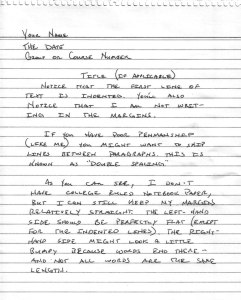
Dear Miss Harper Lee,
I know you’re dead, and therefore unlikely to read this, but I write it nonetheless, because it’s a letter not just to you. You are welcome to read it, though, if that is such a thing given your current state.
I wanted to thank you for my favorite teacher, Mr. Davidson. He loved your book so so so so very much. He made me love it, too. I bet he made other students feel about it, as well.
He taught us the word empathy via your story. I remember that day. I was at Carter Jr. High School.
He was a beloved teacher who tragically lost his young wife who I think also taught at the school. I knew that his wife died because there was a memorial to her in a glass enclosed garden at the school. I don’t know when it happened. It was before my time there, and as a 12-year-old anything 3-4 years prior was the equivalent of olden days. Also this was just something we “knew” and didn’t ask questions about at that time. Like Scout knew some things she just knew.
This is just background, though, because this thing we “knew” was just, you know, background. I don’t have any inkling if he was a different teacher before, since I didn’t know him before.
He didn’t bring his personal loss into the classroom. But, as you wrote, we all bring all of us into every interaction. I’m sure it impacted him, and therefore us, but that’s something I didn’t realize until many years later.
Yes, I still think about this English teacher who taught me to walk around in someone else’s skin before passing judgement (or was that you?). Trying to understand someone doesn’t make what they do “right,” but it acknowledges the other’s humanity, and that makes us more human, too.
I was a bratty smarty pants–not as smart as Hermione Granger but equally annoying. I would read ahead and do my assignments ahead because I was engaged. The class slowed me down. I bet my class participation included spoilers. Mr. Davidson let me write my final paper early. Then he had to do something with me as the class plodded through your novel.
He gave me my first book of poetry to read and sent me off on independent study in the library. I was to write a paper about Edna St. Vincent Millay. I didn’t realize at the time that he was encouraging me to keep my own independence and follow my dreams. Something else I realized many years later when I reread her and about her.
When he handed me back my paper, he looked at me very seriously. Me, Hermione Granger-esque, figured that I was in for it. I really didn’t understand poetry, and maybe I misinterpreted like everything.
He apologized to me.
He said that he was sorry that he was unable to challenge me enough. I heard this at the same time I saw the A+ on the top of the page.
I learned right in that moment that it wasn’t enough to do well or even excellently. Although that remains an ambition. In that exchange, I learned that it was important to stretch yourself as much as you can and to seek out people who will make you reach.
A few years later, I was in the high school gym watching a basketball game. Mr. D. was there and I hadn’t seen him for a long time (3 years which had become less like “olden days” but still a long time). I don’t recall the specifics of the dialogue, but I do remember what he said at the end.
He admonished my high school cynicism–translated to 2016 that would be the unending teen irony. He also told me that a cynic is simply an idealist. In that sentence, he created a space for me to be both.
I finally met up with Mr. D. in his office at the school three or four years ago (which in today’s time frame seems like just yesterday) after decades apart. I thanked him in person for his encouragement that I still draw down from. It wasn’t enough, but I brought him a coffee and a donut.
Thank you, Miss Harper Lee, for being a connector. And for your wonderful book.
Your loyal reader,
Doc Think

Teaching you empathy at such a young age is a gem. I am so happy that you treasure it.
LikeLiked by 1 person